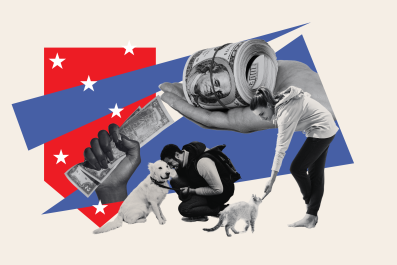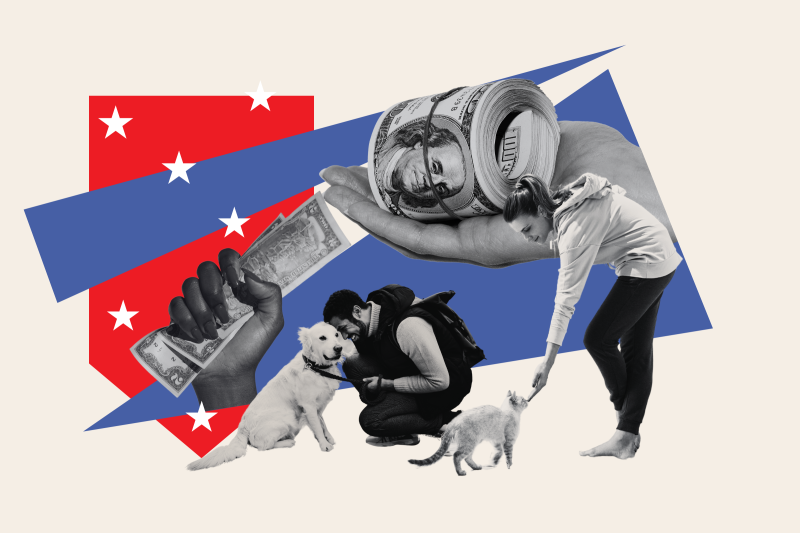
Poll Reveals How Much Americans Spend on Petsâand Gen Z Pay Out Most
When it comes to our pets, we all like to make sure they have everything they could want, but a recent poll commissioned by Newsweek has found that it's Generation Z who are most likely to splurge on their four-legged friends.
There's no doubt that pets mean a lot to us, and many owners like to show that by lavishing them with new toys, tasty treats, or perhaps even renovating an entire bedroom for them. Of course, that usually comes with costly spending habits, and a recent poll has revealed exactly how much people are willing to pay out on their pet.
The exclusive survey of 1,000 U.S. adults conducted by Talker Research for Newsweek has shown that Gen Z (people born between 1997-2012) spend an average of $148.50 on their pets each month, the highest of all those surveyed. Millennials (people born between 1981-1996) have the second highest average, spending $136.20 per month, while the Silent Generation (people born between 1925-1945) had the lowest monthly spend, with $68.90.
The results show that 13 percent of Gen Z would spend under $50 per month on their pets, while 31 percent spend between $50-100. Some would go even further than that though, as 24 percent of Gen Zers reportedly spend $151-200 per month, and 7 percent would spend as much as $201-250.
When asked if it's reasonable to spend money on luxury items or services for a pet, 54 percent of all respondents said yes. Again, Gen Z were the most likely to agree with this as 66 percent said yes, compared to 25 percent who said no. Baby Boomers (people born between 1946-1964) were the least likely generation to agree with this, as just 40 percent answered yes.
The survey also reveals that 88 percent of Americans consider their pet to be just as much a part of the family as a human would be—showing exactly how much they mean to us. This echoes a YouGov poll from 2022 which revealed that nine in 10 people regard their pet as part of the family, with 51 percent of dog owners referring to themselves as their pup's parent. Additionally, 33 percent of dog owners and 21 percent of cat owners consider themselves their best friend.
Patrick Nestel, co-founder of fresh pet food brand BOOST, explained to Newsweek that it's increasingly common to treat a pet like an extra member of the family, and Gen Z seems very happy to spend "more time and money" on preventative measures to keep their pets healthy in the long run.
Whether it's a new brand of healthy pet food, or taking their pup to yoga classes, Nestel says that Gen Z are "quite impressionable" when it comes to trying out new things, especially when there's potential health benefits.
"The same way Gen Z would be more likely to order a matcha latte than their grandparents would be, they are more likely to trial new concepts," he said. "They understand that you are what you eat and they're opting away from cheap highly processed canned or kibble products for cleaner more natural products. They are clued on to the fact that better food may mean less trips to the vet—who certainly aren't reducing their prices any time soon."

According to the American Pet Products Association, the U.S. market saw $147 billion spent on pets in 2023, $64.4 billion on food and treats alone. Vet care and product sales cost approximately $38.3 billion, while other services, such as grooming, accounted for $12.3 billion.
Additional costs that Nestel highlights include grooming services, doggy daycares, and dog walkers, which have proliferated since the COVID-19 pandemic.
Although, it's not just the necessities that owners want to spend their money on, as the YouGov survey highlighted that 57 percent of owners buy holiday gifts for their pets and 40 percent even host birthday celebrations.
While older generations typically have greater spending power, Sam Smith, the associate director of pet retail at Nielsen IQ (NIQ), a consumer intelligence company, explains that Gen Z is showing the fastest growth in spending.
"Older generations may have greater purchasing power due to more established incomes and lifestyles, but Gen Z is quickly catching up, particularly in specific categories where they're driving innovation and adopting new trends," Smith told Newsweek. "Certain non-traditional pet categories, such as birds, fish, and reptiles, are increasingly popular with younger consumers. This is an interesting shift, as traditionally these categories have seen less mainstream attention compared to dogs and cats."
A key driver for Gen Z's increased pet spending could be the influence of social media, as Smith notes that they're a digital-first generation that is constantly connected to the online world. They see what others are buying for their pets and want to recreate that.
"Gen Z grew up in an era not only defined by widespread internet access but also deeply shaped by social media platforms," he said. "NIQ data shows Gen Z's top three digital activities as YouTube, mobile/Wi-Fi radio. This reflects how their engagement with digital spaces is central to their identity, even if not all of it falls under traditional social media."
This random double-opt-in survey was commissioned by Newsweek between September 11 and September 13, 2024. It was conducted by market research company Talker Research, whose team members are members of the Market Research Society (MRS) and the European Society for Opinion and Marketing Research (ESOMAR).
